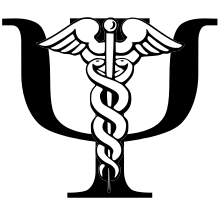
Back Psigiatrie Afrikaans Psiquiatría AN طب نفسي Arabic طب نفسى ARZ মনো ৰোগ বিজ্ঞান Assamese Psiquiatría AST Psixiatriya Azerbaijani سایکیاتری AZB Псіхіятрыя Byelorussian Псыхіятрыя BE-X-OLD
 | |
| Occupation | |
|---|---|
| Names | Physician |
Activity sectors | Medicine |
| Description | |
Education required |
|
Related jobs | |
Psychiatry is the medical specialty devoted to the diagnosis, prevention, and treatment of deleterious mental conditions.[1][2] These include various matters related to mood, behaviour, cognition, perceptions, and emotions.
Initial psychiatric assessment of a person begins with creating a case history and conducting a mental status examination. Physical examinations, psychological tests, and laboratory tests may be conducted. On occasion, neuroimaging or other neurophysiological studies are performed.[3] Mental disorders are diagnosed in accordance with diagnostic manuals such as the International Classification of Diseases (ICD),[4] edited by the World Health Organization (WHO), and the Diagnostic and Statistical Manual of Mental Disorders (DSM), published by the American Psychiatric Association (APA). The fifth edition of the DSM (DSM-5), published in May 2013, reorganized the categories of disorders and added newer information and insights consistent with current research.[5]
Treatment may include psychotropics (psychiatric medicines) and psychotherapy,[6][7] and also other modalities such as assertive community treatment, community reinforcement, substance-abuse treatment, and supported employment. Treatment may be delivered on an inpatient or outpatient basis, depending on the severity of functional impairment or risk to the individual or community. Research within psychiatry is conducted on an interdisciplinary basis with other professionals, such as epidemiologists, nurses, social workers, occupational therapists, and clinical psychologists.
- ^ Backes KA, Borges NJ, Binder SB, Roman BJ (2013). "First-year medical student objective structured clinical exam performance and specialty choice". International Journal of Medical Education. 4: 38–40. doi:10.5116/ijme.5103.b037.

- ^ Alarcón RD (2016). "Psychiatry and Its Dichotomies". Psychiatric Times. 33 (5): 1. Archived from the original on 2019-01-30. Retrieved 2016-07-26.
- ^ Cite error: The named reference
NIMHSitewas invoked but never defined (see the help page). - ^ First, M; Rebello, T; Keeley, J; Bhargava, R; Dai, Y; Kulygina, M; Matsumoto, C; Robles, R; Stona, A; Reed, G (June 2018). "Do mental health professionals use diagnostic classifications the way we think they do? A global survey". World Psychiatry. 17 (2): 187–195. doi:10.1002/wps.20525. PMC 5980454. PMID 29856559.
- ^ Kupfer DJ, Regier DA (May 2010). "Why all of medicine should care about DSM-5". JAMA. 303 (19): 1974–5. doi:10.1001/jama.2010.646. PMID 20483976.
- ^ Gabbard GO (February 2007). "Psychotherapy in psychiatry". International Review of Psychiatry. 19 (1): 5–12. doi:10.1080/09540260601080813. PMID 17365154. S2CID 25268111.
- ^ "Psychiatry Specialty Description". American Medical Association. Archived from the original on 12 October 2020. Retrieved 10 October 2020.